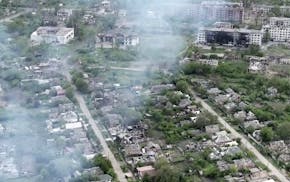The Monday before Thanksgiving was an unexpected day off from school in 1963.
The day was crisp and sunny, and we played touch football until dusk, hiking and passing and running on the street, trying to ignore the gloom inside our homes. None of us wanted to go indoors. Our parents were at home, glued to the tube, speechless and crying. A president was being buried.
Our president. Young and Irish and Catholic. He shook my hand when I was 10: Kennedy was in St. Paul, and I was one of the hundreds in a room where everyone wanted to touch him. Me and Kennedy.
His murder is 45 years ago, and I say "is" because I remember it as if it were yesterday. I was 13, and that made two autumns in a row when the world didn't seem worth waiting for. In the fall of 1962, we had walked to school in the morning expecting to be incinerated by nightfall, while American warships were interdicting Russian freighters carrying nuclear missiles to Cuba.
I sometimes notice a faded sticker on the doorjamb of my house: Three upside-down yellow triangles on a black circle, showing that the place would have served as a fallout shelter if the mushroom clouds had risen over St. Paul. It seems unlikely: I have a hard time keeping rain out of the basement, let alone radioactive fallout. Still, I see the sticker and think I should buy emergency supplies and teach the kids to recognize the different warbles of the warning sirens -- including the forlorn wail that means it is worse than a tornado. We knew that wail when I was young, and we knew how to find a fallout shelter, and how to duck and cover.
But I have lost my religion since then. I'm not sure that I want to be ready for the end of the world anymore.
On Nov. 22, 1963, I was at home, eating a baloney sandwich and a bowl of soup, watching "Lunch With Casey" on Channel 11. I would have to go back to school in a few minutes, but I was dawdling so I could watch "The Mighty Hercules." Hercules was one of those bad-animation cartoons, but it had a great theme song sung by Johnny Nash, with lyrics that wouldn't strike me as slightly weird until years later: "Hercules ... softness in his eyes, iron in his thighs, virtue in his heart, fire in every part, of the mighty Hercules!"
Iron in his thighs? Even in 1963, that was too much information. Hercules was winding up when the first TV bulletins came across, telling us that the president had been shot. I ran the 10 blocks back to school, shouting on the asphalt playground, where the other kids were doing the usual Friday afternoon rumba of pushing and shoving while waiting for the bell to start the afternoon classes. I told my friends that the president had been shot, but Sister Marie Genevieve, who was upset by my report, didn't believe it. She yanked me by the ear and pulled me inside the school to reprimand me for lying. But by that time, other grim-faced nuns had arrived with the same information. We spent the rest of the day, books closed, sitting at attention in our desks, listening to radio reports from Dallas, and to the funeral music that played between the bulletins.
That was a day everything changed, a day that must have felt like Dec. 7, 1941, to an older generation, a day that felt like Sept. 11, 2001, would feel to me as a grown-up:
Grief, anger, worry.
To a person born later, talking about JFK must be as quaint as talking about Lincoln might have seemed in 1910, as distant in time as Pearl Harbor seemed to me in 1986 or how removed 9/11 will feel in 2046. If we are lucky, 9/11 will seem like something ancient then, as far off as Dallas, 1963, is today.
But Americans carry all these things with us, even if we are not consciously aware of harboring a dread that our hopes and dreams will be cut short by events. Since the election of Barack Obama -- already threatened by racists in white tuxedos carrying weapons and a death wish -- there has been more talk about assassination fears than I can ever remember.
It's as if we know to be careful, to hold our breath and to take nothing for granted. Fallout shelter stickers are still on our doors, after all. And memories of 1963 and other dark days are deep in our subconscious.
"The torch will be passed again," Ted Kennedy told the Democratic convention that nominated Obama. "The work begins anew. The hope rises again, and the dream lives on."
Yes, for all Americans.
Tempered, for some of us, by memories of football on a day we were supposed to be in school, and our country wept.
ncoleman@startribune.com • 612-673-4400
Sign up for Star Tribune newsletters

Drone footage shows Ukrainian village battered to ruins as residents flee Russian advance
In heated western Minn. GOP congressional primary, outsiders challenging incumbent

